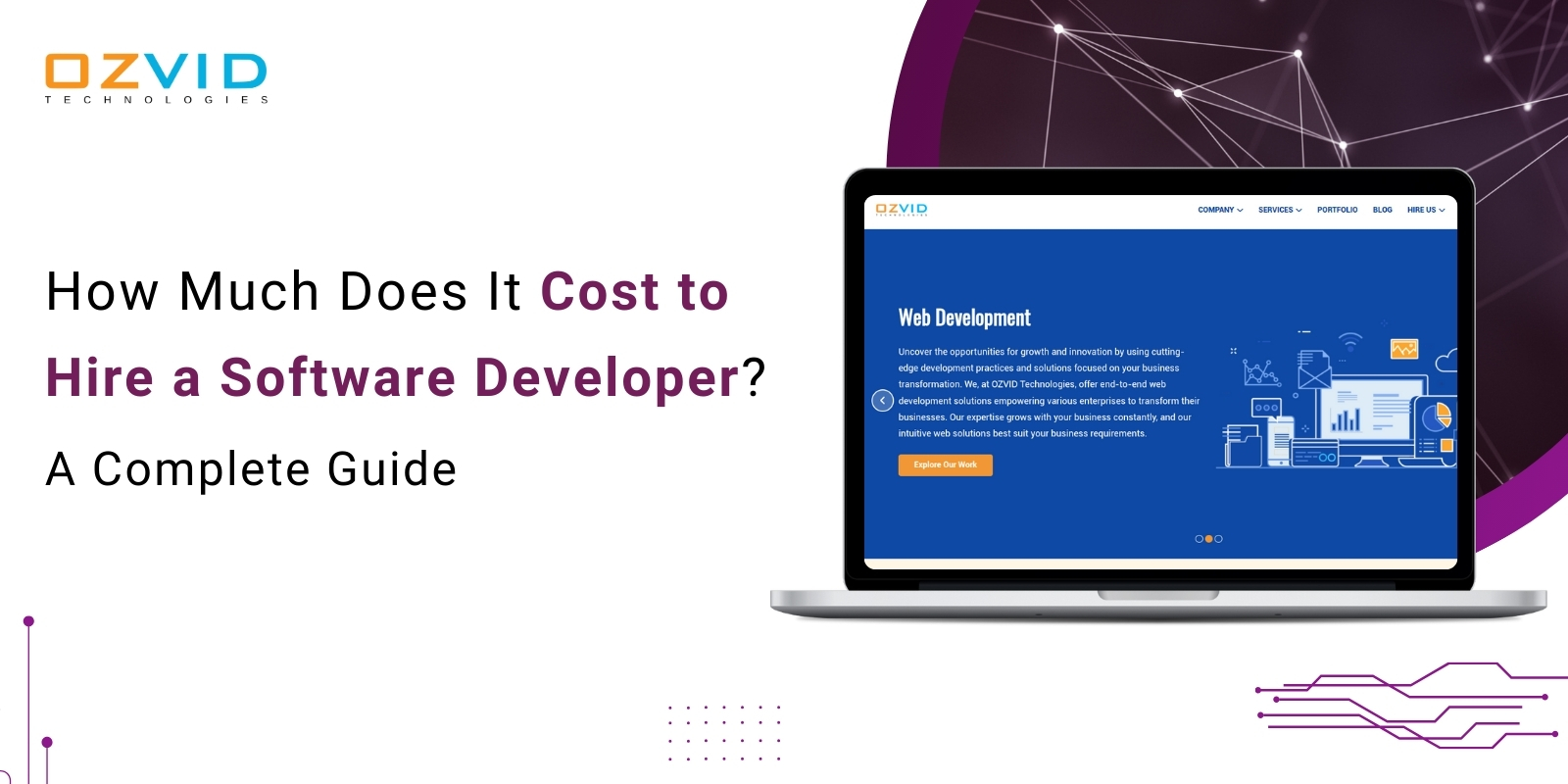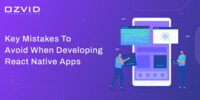- Nov 20, 2025
Share this post on:

In today’s technology-driven business world, software plays a critical role in driving innovation, efficiency, and scalability. Whether you are a startup building your first product, an established enterprise looking to modernize your operations, or a business planning to launch a new mobile app, the demand for highly skilled developers has never been higher. One of the most common questions businesses ask is: how much does it cost to hire a software developer?
The answer is not straightforward because the cost varies depending on factors like the developer’s skills, type of software you want to build, project scope, and even the geographical region where the developer is based. From agile software development methodologies to engaging with custom software development companies, the choices you make during the hiring process will directly influence both the cost and the success of your project.
At OZVID Technologies, we understand the importance of hiring the right talent while balancing costs and quality. This guide provides a complete breakdown of software developer types, cost structures, influencing factors, and practical tips to help you make an informed decision.
Key Takeaways
- Hiring a software developer requires clear project planning, defined goals, and the right engagement model.
- Costs vary based on skills, experience, location, and project complexity.
- Adopting agile software development ensures flexibility, efficiency, and budget control.
- Outsourcing to trusted software development firms helps reduce overhead and access global talent.
- Starting with an MVP and prioritizing essential features helps control costs while ensuring faster delivery.
Different Types of Software Developers
When businesses plan to hire a software developer, the first and most important step is to understand the different types of developers available and how their skill sets align with your unique project needs. Software development is a vast domain, and developers specialize in different areas of expertise to cater to specific business goals. By knowing the types of software developers, you can make an informed decision and avoid hiring the wrong professional, which may lead to delays, unnecessary costs, and underwhelming results.
Type of Developer | Core Skills & Expertise |
|---|---|
Front-End Developer | HTML, CSS, JavaScript, React, Angular, Vue.js, UI/UX design, responsive layouts. |
Back-End Developer | Node.js, Java, Python, PHP, Ruby, databases (MySQL, MongoDB), APIs, server-side logic. |
Full-Stack Developer | Combination of front-end & back-end skills, cloud platforms, version control (Git), system architecture. |
Mobile App Developer | Swift (iOS), Kotlin/Java (Android), Flutter, React Native, cross-platform mobile app development software. |
DevOps Engineer | CI/CD pipelines, Docker, Kubernetes, cloud services (AWS, Azure, GCP), automation, deployment. |
Data Scientist/AI Developer | Machine learning, Python (TensorFlow, PyTorch), data analysis, predictive modeling, artificial intelligence solutions. |
Game Developer | Unity, Unreal Engine, C++, 3D graphics, AR/VR technologies, real-time rendering. |
IoT Developer | Embedded systems, C/C++, Python, IoT protocols (MQTT, CoAP), hardware integration, smart device connectivity. |
Here is a comprehensive breakdown of the main types of software developers:
1. Front-End Developers
Front-end developers are responsible for everything the user interacts with directly. They design and implement the user interface (UI) and ensure that the user experience (UX) is seamless, engaging, and intuitive. Their role is to transform static designs into functional and interactive web or mobile interfaces.
Key Skills and Tools:
- Languages: HTML, CSS, JavaScript
- Frameworks: React, Angular, Vue.js
- Tools: Figma, Adobe XD, and various mobile app development software for design integration
Role in Your Project:
If your project focuses heavily on customer engagement, visual appeal, and usability, hiring a front-end developer is crucial. They ensure your product looks professional, loads quickly, and adapts to different screen sizes and devices.
2. Back-End Developers
While front-end developers focus on the visible side of an application, back-end developers work behind the scenes. They design the server, application, and database that power the front-end experience. Essentially, they build the “engine” of your software.
Key Skills and Tools:
- Languages: Java, Python, PHP, C#, Ruby
- Frameworks: Node.js, Django, Laravel, Spring
- Databases: MySQL, MongoDB, PostgreSQL
Role in Your Project:
Back-end developers are indispensable when your business requires secure transactions, data storage, and complex integrations. For example, an e-commerce platform needs strong back-end support to process payments, manage inventories, and handle user accounts efficiently.
3. Full-Stack Developers
A full-stack developer is often described as the “jack-of-all-trades” in the software development world. They possess expertise in both front-end and back-end development, which means they can handle the entire development cycle.
Why Hire a Full-Stack Developer?
- Ideal for startups or small businesses with limited budgets.
- Reduces the need to hire separate front-end and back-end teams.
- Can quickly switch between client-side and server-side tasks.
Role in Your Project:
Full-stack developers are particularly useful when building prototypes, minimum viable products (MVPs), or smaller-scale projects that require speed and efficiency without compromising quality.
4. Application Developers
An application developer specializes in building software applications for specific platforms such as desktop systems, iOS devices, or Android phones. Unlike general software developers, their expertise lies in crafting apps tailored to meet user requirements and platform standards.
Key Types of Application Developers:
- Web Application Developers: Focus on browser-based applications accessible from any device.
- Mobile Application Developers: Build native or hybrid apps using mobile app development software such as Flutter, React Native, or Swift.
- Desktop Application Developers: Create applications that run on operating systems like Windows, macOS, or Linux.
Role in Your Project:
If your business needs a mobile app to engage customers or a desktop solution to manage internal processes, hiring an application developer ensures you get optimized performance for your chosen platform.
5. Mobile App Developers
In a mobile-first world, mobile app developers are among the most sought-after professionals. They design and build apps that run smoothly on Android, iOS, or cross-platform frameworks.
Key Skills and Tools:
- For iOS: Swift, Objective-C, Xcode
- For Android: Java, Kotlin, Android Studio
- For Hybrid Apps: Flutter, React Native, Xamarin
Role in Your Project:
If your business strategy revolves around delivering value through mobile apps, such as e-commerce, food delivery, healthcare services, or fintech solutions, you need skilled mobile app developers. They use advanced mobile app development software to ensure seamless functionality, attractive design, and user retention.
6. Custom Software Developers
Sometimes, off-the-shelf solutions are not enough to meet unique business needs. That’s where custom software developers come in. They specialize in building tailor-made solutions from scratch, ensuring the software aligns perfectly with your processes, goals, and scalability requirements.
Advantages of Custom Software Development:
- Higher security compared to generic software
- Better scalability as your business grows
- Competitive edge with unique features
- Long-term cost efficiency despite higher initial investment
Role in Your Project:
If you want to innovate, differentiate your business, and achieve long-term ROI, working with custom software development companies is the best choice. They provide experienced custom software developers who understand industry standards and integrate business-specific features.
7. DevOps Developers
DevOps developers focus on bridging the gap between development and operations. They streamline the software development lifecycle by automating processes such as testing, deployment, and monitoring.
Key Skills and Tools:
- Tools: Jenkins, Docker, Kubernetes, Git
- Expertise: Continuous Integration/Continuous Deployment (CI/CD), cloud services (AWS, Azure, GCP)
Role in Your Project:
Hiring a DevOps developer is essential if your project demands faster time-to-market, frequent updates, and a reliable deployment process. They ensure your product remains stable, scalable, and adaptable over time.
8. Database Developers
Database developers specialize in designing, implementing, and maintaining databases. They ensure that data is stored securely, retrieved efficiently, and integrated properly into the application.
Key Skills and Tools:
- SQL, Oracle, MongoDB, Cassandra
- Data modeling and database architecture design
Role in Your Project:
Businesses dealing with large volumes of customer or transactional data should consider hiring a database developer to ensure smooth, secure, and fast data operations.
Cost to Hire a Software Developer
When businesses decide to hire a software developer, one of the most pressing questions they face is: how much will it cost? While every organization wants the best talent, budget constraints and cost optimization play a vital role in decision-making. The cost of hiring a software developer is not a one-size-fits-all answer, it depends on several factors such as project scope, type of developer, location, and engagement model.
To give you a clearer picture, let’s break down the various aspects of cost.
1. Hourly Rates of Software Developers
One of the most common ways businesses engage developers is by paying an hourly rate. These rates vary widely across regions and levels of expertise.
Entry-Level Developers (Junior): Typically range between $20 to $50 per hour. These developers are suitable for simple projects, minor updates, or assisting senior developers.
Mid-Level Developers: Cost between $50 to $100 per hour, offering a balance of experience and affordability. They are ideal for projects that require solid expertise but not highly specialized skills.
Senior Developers (Experts): Can charge anywhere from $100 to $200+ per hour, depending on their specialization, years of experience, and track record. These developers are indispensable for large-scale, complex, and mission-critical projects.
2. Annual Salaries for In-House Developers
If you plan to build a dedicated, in-house team, then salaries become the primary cost component. Salaries also vary significantly depending on geography:
United States & Canada: A mid-level in-house software developer earns between $80,000 to $120,000 per year, while senior developers can make upwards of $150,000 annually.
Western Europe (UK, Germany, France): Salaries average between €60,000 to €100,000 annually, depending on skills and industry.
Eastern Europe (Poland, Ukraine, Romania): Developers cost significantly less, averaging between $30,000 to $60,000 annually, while still providing high-quality services.
India & Southeast Asia: One of the most cost-effective regions to hire from, with annual salaries averaging $12,000 to $25,000, making it a popular outsourcing destination for global companies.
3. Regional Cost Variations
Geographical location plays perhaps the most influential role in determining cost. The same level of skill may cost three to five times more depending on where the developer is based. At OZVID Technologies, we leverage our global presence to provide top-quality software development services at competitive pricing, making us an attractive partner for businesses worldwide.
4. Cost by Type of Developer
Different types of developers command different rates based on their specialization:
Front-End Developers: $25 to $80 per hour, depending on region.
Back-End Developers: $30 to $100 per hour.
Full-Stack Developers: $40 to $120 per hour, as they cover both ends of development.
Mobile Application Developers: $30 to $120 per hour, depending on whether they specialize in Android, iOS, or cross-platform.
Custom Software Developers: $50 to $150 per hour, since their expertise in custom software development is highly specialized and tailored.
DevOps Engineers: $40 to $120 per hour, critical for large-scale projects needing automation and reliability.
5. Cost by Engagement Model
The engagement model you choose to work with a software development agency or individual developer also influences cost.
Freelancers
- Pros: Flexibility, lower upfront cost, wide availability.
- Cons: Less reliability, varying quality, limited scalability.
- Average Cost: $20 to $100 per hour.
In-House Developers
- Pros: Complete control, cultural alignment, long-term availability.
- Cons: High salary, overhead costs (benefits, office space, training).
- Average Cost: $80,000 to $150,000 annually.
Outsourcing to Software Development Firms
- Pros: Access to diverse talent, established processes, scalable teams, and proven quality.
- Cons: Less direct control compared to in-house teams (though mitigated with proper communication).
- Average Cost: $30 to $100 per hour depending on the firm’s location and expertise.
Dedicated Team Model
Many custom software development companies (like OZVID Technologies) offer dedicated teams tailored to your project. This option ensures scalability and flexibility while keeping costs predictable.
- Average Cost: $5,000 to $20,000 per month per developer, depending on expertise and region.
6. Hidden Costs to Consider
When calculating the cost to hire a software developer, many businesses overlook hidden expenses that can impact the total budget:
- Recruitment Costs: Hiring in-house developers requires job postings, interviews, and onboarding.
- Training and Upskilling: Developers need continuous training, especially in emerging technologies.
- Tools and Infrastructure: Licenses for app development software, servers, testing tools, and cloud services.
- Management Overhead: Project managers, communication tools, and quality assurance processes.
- Turnover Costs: Replacing a developer mid-project can delay timelines and increase expenses.
By partnering with an experienced software development company like OZVID Technologies, these hidden costs are absorbed into predictable pricing models, reducing risk and uncertainty.
7. Example Scenarios of Cost
To put costs into perspective, here are a few practical scenarios:
Small Startup MVP:
- Hiring a small team of 2–3 developers from Asia or Eastern Europe may cost around $30,000 – $50,000 for a basic mobile app prototype.
Mid-Size Business Application:
- Building a custom web or mobile application with a dedicated team through a software development agency could range from $80,000 – $200,000, depending on complexity.
Enterprise-Level Software:
- Large organizations that require custom software development with advanced security, integrations, and scalability may spend $250,000 to $1 million+ for a full-fledged solution.
8. Why Costs Are an Investment, Not an Expense
It’s important to view the cost of hiring a software developer not as an expense but as an investment in business growth. High-quality software enhances customer satisfaction, improves efficiency, and creates new revenue streams. Cheaper isn’t always better—hiring the wrong developer can result in poor code quality, delays, and long-term maintenance headaches.
That’s why partnering with trusted software development firms like OZVID Technologies ensures that your money is spent wisely on expertise, innovation, and reliability.
Region | Monthly Cost Range | Highlights |
|---|---|---|
North America | $12,000 – $20,000 | Highest rates due to strong demand, advanced skills, and living costs. |
Western Europe | $8,000 – $15,000 | Competitive market with solid expertise, slightly lower than the U.S. |
Eastern Europe | $4,000 – $7,000 | Cost-effective, skilled developers, popular outsourcing destination. |
Asia (India, etc.) | $2,500 – $6,000 | Most affordable, large talent pool, strong in custom development. |
Latin America | $3,500 – $8,000 | Good nearshoring option for U.S. firms, affordable with growing talent. |
Factors Affecting the Cost of Hiring a Software Developer
The cost to hire a software developer is influenced by several important factors. Understanding these helps businesses plan their budget realistically and avoid unexpected expenses. At OZVID Technologies, we always guide our clients through these factors to ensure transparency and better decision-making.
1. Skill Level and Experience
The developer’s experience is one of the most significant factors in determining cost.
- Junior Developers: Typically cost less but are best suited for simple projects or tasks like bug fixes and minor updates.
- Mid-Level Developers: More experienced, capable of handling moderately complex projects with less supervision.
- Senior Developers: Highly skilled professionals who bring in-depth knowledge, problem-solving ability, and the ability to design complex systems. They cost more but ensure fewer errors, faster problem resolution, and higher overall quality.
Choosing the right level of expertise depends on the complexity and goals of your project.
2. Type of Project
Not all projects require the same resources. A basic website or small-scale application will naturally cost less than an enterprise-grade solution.
- Simple Projects: Landing pages, basic websites, or MVPs are less resource-intensive.
- Medium Projects: E-commerce platforms, data-driven apps, or multi-user systems require more development hours and higher expertise.
- Complex Projects: Enterprise-level systems, AI-powered tools, or custom software development projects often involve multiple technologies, advanced integrations, and longer timelines, which increases costs.
3. Geographic Location
The region where you hire developers makes a huge difference in cost. Developers in countries like the U.S., Canada, or Western Europe usually charge the highest rates. On the other hand, hiring from regions like India or Southeast Asia provides highly skilled professionals at more affordable rates.
For example:
- U.S. / Canada: $100 – $200 per hour
- Western Europe: $70 – $150 per hour
- Eastern Europe: $30 – $70 per hour
- India & Southeast Asia: $20 – $50 per hour
Many businesses prefer outsourcing to trusted software development firms in cost-efficient regions to balance quality and budget.
4. Development Methodology
The approach used in building software can also influence costs.
- Waterfall Model: May cost less initially but is rigid, and changes later in the project can become expensive.
- Agile Software Development: While it may seem costlier upfront because of its iterative cycles, agile reduces risks, prevents costly errors, and delivers a product that matches your needs more closely. In the long run, it often proves more economical.
5. Type of Software
The kind of software you want to build plays a critical role in cost.
- Web Applications: Usually less expensive compared to mobile apps.
- Mobile Applications: Require expertise in mobile app development software and often cost more due to platform-specific development.
- Custom Software Development: Tailored solutions built from scratch cost higher than off-the-shelf options because of advanced features, scalability, and unique business requirements.
6. Engagement Model
How you choose to work with developers also affects costs.
- Freelancers: Flexible and often cheaper but may lack consistency or accountability.
- In-House Developers: Provide long-term value but involve high salaries, benefits, and overhead expenses.
- Software Development Agency: Offers the advantage of dedicated teams, structured processes, and predictable pricing, making it a balanced choice for businesses seeking reliability.
7. Project Timeline and Urgency
If your project requires a quick turnaround, costs may increase because developers need to work overtime or prioritize your project over others. Longer timelines with flexible deadlines usually allow more cost-efficient planning.
8. Tools and Technology Stack
Advanced technologies and premium app development software tools come with licensing fees and higher expertise requirements. For example, a project requiring AI, blockchain, or cloud-based solutions may cost more than a standard web application.
Tips to Reduce the Cost of Hiring a Software Developer
Hiring skilled professionals can sometimes feel overwhelming for businesses, especially when trying to balance quality with budget constraints. However, with the right strategies, you can significantly reduce the cost of hiring a software developer without compromising on the quality of your project. At OZVID Technologies, we have helped businesses worldwide optimize costs while still achieving robust and scalable solutions.
Here are some proven strategies to reduce costs:
1. Define Clear Project Requirements
One of the most common reasons projects go over budget is unclear or constantly changing requirements. If your project scope is not well-defined, developers may spend unnecessary time revisiting and rewriting code, leading to higher costs.
How to Save Costs:
- Document your goals, features, and workflows in detail before development begins.
- Use wireframes or mockups to communicate your vision clearly.
- Break your requirements into “must-have” and “nice-to-have” features so developers know what to prioritize.
At OZVID Technologies, we always begin by helping clients refine their project scope to avoid scope creep and unnecessary expenses.
2. Use Agile Software Development
Adopting agile software development ensures flexibility and cost savings in the long run. Instead of building the entire software at once, agile breaks the process into smaller sprints with regular feedback loops.
Why Agile Reduces Costs:
- Early testing identifies errors quickly, saving money on later fixes.
- Clients can change requirements mid-project without starting from scratch.
- The software is developed in functional increments, meaning you start getting value sooner.
This iterative approach helps businesses avoid large upfront costs and allows smarter budget management.
3. Outsource to Trusted Software Development Firms
Hiring developers in-house may sound appealing, but it comes with high overheads such as salaries, benefits, training, and office space. A cost-effective alternative is outsourcing to reputable software development firms.
Benefits of Outsourcing:
- Access to a global talent pool at competitive rates.
- No overhead costs of recruitment, HR, or infrastructure.
- Flexible engagement models: pay only for the time or resources you need.
For example, outsourcing to custom software development companies in regions like India allows businesses to hire experienced developers at a fraction of the cost compared to U.S. or European rates.
4. Hire Full-Stack Developers
When budgets are tight, hiring specialized developers for every task can become expensive. A full-stack developer is proficient in both front-end and back-end development, allowing one person to handle multiple roles.
Advantages of Hiring Full-Stack Developers:
- Reduced hiring costs since fewer team members are needed.
- Faster communication and collaboration as one developer manages end-to-end tasks.
- Ideal for small to medium projects where resources are limited.
At OZVID Technologies, our team includes experienced full-stack developers who provide cost-effective solutions without compromising on quality.
5. Start with a Minimum Viable Product (MVP)
Building an entire product with every feature in mind can be expensive and time-consuming. Instead, start with an MVP — a simplified version of your software that includes only the core functionalities.
Why an MVP Saves Costs:
- Reduces initial development time and expenses.
- Provides a working product that can be tested with real users.
- Helps businesses validate their ideas before investing heavily.
Once the MVP proves successful, you can scale and add advanced features gradually.
6. Leverage Open-Source Tools and Frameworks
Many powerful tools, frameworks, and mobile app development software are available for free or at low cost. Using these instead of building everything from scratch significantly cuts expenses.
Examples:
- Front-end frameworks like React or Angular
- Back-end frameworks like Django or Laravel
- Mobile app tools like Flutter or React Native
These solutions speed up development, lower licensing costs, and ensure high-quality standards.
7. Optimize Team Size and Structure
Larger teams don’t always mean faster development. In fact, managing too many developers can lead to inefficiencies and miscommunication. Instead, aim for the right balance of skills within a lean team.
Cost-Saving Tip:
- Hire a small but highly skilled team from a software development agency that provides developers, testers, and project managers as a package. This avoids unnecessary overhead and ensures smooth collaboration.
8. Focus on Long-Term Partnerships
Hiring developers for one-off projects can be expensive because each new team requires onboarding, orientation, and setup. Building a long-term relationship with a reliable software development company helps reduce costs over time.
Why Long-Term Partnerships Work:
- Developers become familiar with your business and workflows, reducing onboarding time.
- Trust and collaboration improve efficiency.
- Costs become more predictable with long-term engagement models.
9. Prioritize Features Based on ROI
Not every feature adds the same value to your business. By prioritizing features that generate the highest return on investment (ROI), you can avoid spending money on unnecessary add-ons.
How to Do This:
- Rank features by their importance to your target users.
- Build the most impactful features first.
- Add secondary features in later phases when budget allows.
10. Regular Testing and Quality Assurance
It may sound counterintuitive, but investing in testing actually reduces costs in the long run. Catching bugs early prevents costly fixes after deployment.
Why It Saves Money:
- Fixing bugs during development is 5–10 times cheaper than fixing them post-launch.
- Ensures customer satisfaction, avoiding losses due to bad reviews or low adoption.
OZVID Technologies integrates testing throughout the development lifecycle, ensuring both cost efficiency and product reliability.
Steps to Hire a Software Developer
Hiring the right software developer is not just about posting a job description and waiting for applications. It’s a systematic process that involves careful planning, evaluation, and collaboration. Businesses that invest time in structured hiring often save costs, minimize risks, and build stronger, more scalable solutions. At OZVID Technologies, we follow a proven process to help clients find the perfect match for their projects.
Here’s a step-by-step breakdown:
1. Identify Your Project Needs and Goals
Before you begin searching for a developer, it’s crucial to clearly understand your project. Many businesses rush into hiring without defining what they want, which leads to mismatches and wasted resources.
What to Do:
- Define the purpose of your software - is it a mobile app, a web application, or enterprise software?
- List the key features, integrations, and functionalities required.
- Identify whether you need custom software development, app development software, or enhancements to an existing product.
- Decide on the platform (iOS, Android, web, or cross-platform) and whether you need a specialized application developer or a full-stack developer.
By aligning your project requirements upfront, you can target the right developers with the right skill sets.
2. Choose the Hiring Model
Businesses have several options when it comes to hiring developers. The right model depends on your project complexity, budget, and long-term vision.
Common Hiring Models:
- Freelancers – Ideal for short-term tasks but may lack accountability.
- In-house Developers – Suitable for long-term projects but comes with high overhead costs (salaries, training, infrastructure).
- Dedicated Developers from Software Development Firms – The most flexible option, offering experienced developers on-demand without additional overhead.
At OZVID Technologies, we provide flexible engagement models, allowing businesses to choose between hourly, part-time, or dedicated full-time developers based on their requirements.
3. Define the Skill Set Required
Not all developers are the same. Different projects demand different skills and expertise. Once you know your project type, the next step is identifying the exact skills your developer should have.
Examples:
- For mobile app development software: Proficiency in Swift, Kotlin, Flutter, or React Native.
- For web applications: Skills in JavaScript frameworks (Angular, React, Vue) and back-end technologies (Node.js, Django, Laravel).
- For custom software development: Experience in databases, cloud platforms, APIs, and security protocols.
- For agile software development projects: Strong communication and adaptability skills for iterative processes.
A clear skill checklist helps filter out unsuitable candidates early.
4. Shortlist Potential Developers or Firms
After identifying your needs, begin searching for candidates. This can include individual developers, teams, or entire software development firms.
Where to Look:
- Developer marketplaces and platforms.
- Reputable custom software development companies like OZVID Technologies.
- Professional networks and referrals.
- Evaluation Criteria:
- Portfolio of past projects.
- Experience in your industry.
- Client testimonials and case studies.
- Technical expertise in your required technology stack.
5. Conduct Technical Screening and Interviews
Hiring a developer is not just about resumes - you must test their actual skills. This stage ensures you’re bringing in someone capable of handling your project requirements.
How to Assess Developers:
- Technical Assessments: Coding tests, algorithm challenges, or sample project tasks.
- Portfolio Review: Examine past applications or software they’ve built.
- Problem-Solving Ability: Check how they approach real-world challenges.
- Communication Skills: For collaborative projects, clear communication is just as important as coding.
At OZVID Technologies, we conduct a rigorous screening process to ensure our clients are matched with developers who not only meet technical requirements but also align with their work culture and project goals.
6. Discuss Project Timelines and Budget
Before hiring, ensure both parties are aligned on budget and timelines. Many projects fail because of unrealistic deadlines or hidden costs.
What to Clarify:
- Estimated project duration.
- Hourly or fixed pricing models.
- Payment milestones tied to deliverables.
- Flexibility for scope changes under agile software development.
- Transparent discussions at this stage prevent misunderstandings later.
7. Start with a Trial Project
Jumping directly into a long-term contract may not always be wise. A short trial project allows you to evaluate the developer’s skills, work ethic, and communication style before fully committing.
Benefits of a Trial Project:
- Validates technical expertise.
- Tests compatibility with your team.
- Minimizes risks of a poor hire.
At OZVID Technologies, we often suggest starting with a small proof-of-concept or MVP before moving into full-scale custom software development.
8. Set Up Communication and Collaboration Tools
Clear communication is the backbone of successful software development. Even the most skilled application developer will struggle without proper collaboration tools in place.
Recommended Tools:
- Project Management: Jira, Trello, Asana.
- Communication: Slack, Microsoft Teams, Zoom.
- Code Management: GitHub, GitLab, Bitbucket.
By setting up transparent workflows, you ensure accountability, reduce rework, and maintain smooth progress throughout the project.
9. Sign Contracts and Agreements
Formalizing the partnership is a crucial step. Contracts protect both parties and ensure clarity regarding responsibilities, deliverables, and timelines.
Key Aspects to Include:
- Scope of work and deliverables.
- Payment structure and terms.
- Intellectual property (IP) rights and confidentiality agreements.
- Exit clauses in case of disputes.
A reliable software development agency like OZVID Technologies always ensures proper contracts and NDAs to safeguard clients’ business interests.
10. Onboard and Begin Development
Finally, once contracts are signed, it’s time to onboard your developer and officially start the project. Proper onboarding helps developers quickly understand your business objectives, workflows, and expectations.
Best Practices:
- Share documentation, brand guidelines, and coding standards.
- Introduce them to your in-house or remote teams.
- Kick off with a detailed project briefing session.
At OZVID Technologies, we believe strong onboarding sets the tone for a smooth and efficient development journey.
Why Choose OZVID Technologies?
Selecting the right partner when you hire a software developer is critical for the success of your project. At OZVID Technologies, we combine technical expertise, innovation, and client-first strategies to deliver scalable and cost-effective software development services. Here’s why businesses choose us:
1. Proven Expertise Across Industries
With years of experience delivering software development services, OZVID Technologies has successfully served startups, enterprises, and global clients. Our expertise spans healthcare, fintech, e-commerce, and education, making us a trusted partner for businesses across diverse industries.
2. Skilled and Dedicated Developers
Our team includes highly skilled software developers, full-stack engineers, and application developers who specialize in modern technologies. Whether you need custom software development or mobile app development software, our dedicated professionals ensure innovative, scalable, and reliable solutions tailored to your goals.
3. Flexible Engagement Models
OZVID Technologies offers cost-effective and adaptable hiring models to suit businesses of all sizes. From hourly contracts to dedicated teams, we give you the flexibility to scale resources as per your project requirements without unnecessary overhead.
4. Focus on Agile Software Development
We follow agile software development methodologies to deliver faster results, continuous improvements, and seamless communication. Our iterative process allows clients to stay involved at every stage, ensuring maximum transparency, reduced risks, and efficient use of budgets.
5. Commitment to Quality and Innovation
At OZVID Technologies, we prioritize quality, security, and innovation in every project. Our solutions undergo rigorous testing and validation, ensuring long-term performance. By leveraging cutting-edge tools, we help clients gain a competitive edge in today’s fast-changing digital landscape.
Conclusion
The cost to hire a software developer depends on multiple factors, including expertise, project complexity, and engagement models. Whether you choose freelancers, build an in-house team, or collaborate with software development firms, making the right decision is vital for your business success.
At OZVID Technologies, we combine innovation, technical expertise, and a client-first approach to deliver tailored solutions. Whether you need mobile app development software, custom software development, or complete software development services, we are your reliable partner. Our goal is to help businesses achieve digital transformation with scalable, efficient, and cost-effective solutions.
If you are ready to bring your software ideas to life, contact us today, the trusted software development agency that delivers excellence.
FAQ's
1. How long does it usually take to complete a custom software project?
Timelines depend on complexity, features, and team size. Small projects may take 3–4 months, while enterprise-level solutions with advanced integrations can extend beyond a year, especially when scaling for performance and security.
2. How does integrating artificial intelligence impact software development costs?
Adding artificial intelligence features such as chatbots, predictive analytics, or automation increases costs due to advanced algorithms and specialized expertise. However, the long-term benefits include improved efficiency, smarter decision-making, and better user experiences.
3. What are the benefits of incorporating IoT in custom software development?
IoT integration enables real-time data collection, smarter automation, and enhanced connectivity between devices. It adds complexity to development, but the benefits include improved operational efficiency, predictive maintenance, and innovative customer solutions across industries.
4. What engagement models are available when hiring software developers?
Common engagement models include hourly contracts, fixed-price projects, and dedicated team models. Each has unique advantages depending on project complexity, budget flexibility, and long-term requirements, offering businesses control over costs and scalability.
5. Why should businesses consider building a minimum viable product first?
Developing a minimum viable product helps validate the core idea before investing in full-scale development. It reduces risks, saves costs, allows faster market entry, and provides valuable user feedback for future improvements and scaling.










